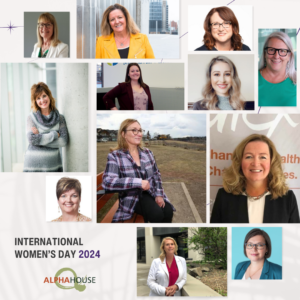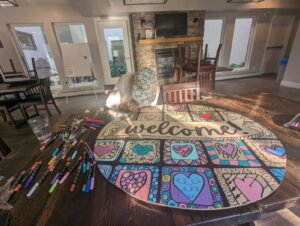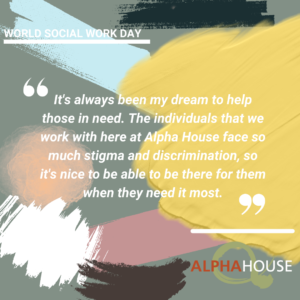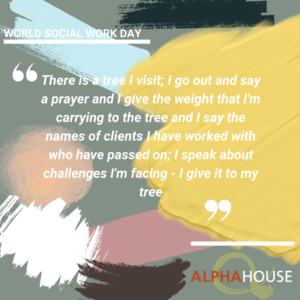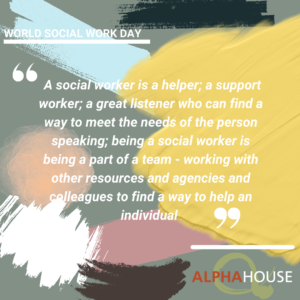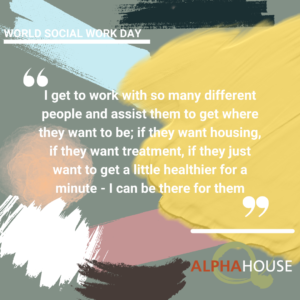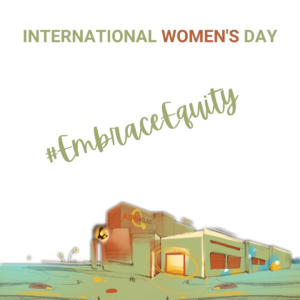Inside Scoop – Volunteering at Alpha House
Shaundra Bruvall | April 25, 2025
Happy National Volunteer Week, Calgary!
The kitchen and the laundry rooms are where you’ll find most of our volunteers, but we also have a few out-of-the-box opportunities for people to get involved! Our Detox program brings in volunteers for different types of programming like yoga, acupuncture, and art therapy. We caught up with several of our regular volunteers as well as one of our newest volunteers who’s been teaching yoga classes for our Detox clients to hear about their experience volunteering with Alpha House.
Detox Volunteer
Julianne, hosts yoga classes for clients in our detox program. We asked her what inspired her to start teaching yoga in this setting:
“I was always so amazed at how much better I would feel by doing yoga, and how efficient it was at radically changing my mood and calming me down. At some point, around 2012, I remember thinking that if this is so helpful for me, then there must be others in the community who could benefit from it, that don’t have access to yoga— it’s very expensive and can have an elitist image attached to it, which I find really unfortunate because it is so simple.”
Why Alpha House, we asked:
“I’ve always wanted to volunteer with the homeless community, and I thought this could finally be an opportunity to teach yoga to those in need like I wanted to all those years ago. I live in the Beltline and Alpha House is very active in this community. When I was working downtown, I would see so many people on my walk to work who were struggling— I just felt so helpless, and I wanted to be able to do something to help them. Alpha House was the first place that I thought of, and I wanted to help within my own community so it was a great fit.”
Julianne has taught a number of classes at Alpha House, which means her experience has been good…. Right Julianne?
“This will be my third class today. It’s been really positive. (Excellent!) I can tell you a story. (Please do!)
So, my first class, I had four students, and we were working on balancing with the tree pose. I was impressed with how solid their balances are and how present everyone was during the class, given that this isn’t a formal yoga studio.
While I was teaching, I related balancing to conquering a fear, conquering a fear outside of this room. Whatever that is for them, whether it’s coming to Alpha House or another fear that they’ve conquered in their lives. With balancing, the worst thing that can happen is that you’re gonna fall on your face, and really, is it that bad?
Even for myself that day, I had realized that I needed to push myself to face the unknown in my personal life, and get out of that state of fear where you feel like the worst thing is going to happen.”
That’s such a beautiful message, especially for a group of people who are currently in phases of their life where they are facing the unknown and probably are experiencing some fear around that. What’s been the biggest challenge, we wondered, since this is a new population for Julianne?
“So, my first class, I did have an individual who wasn’t able to follow along because he had a recent back surgery. He told me that he had done lots of yoga in the past, and when he wasn’t able to follow along, he was able to trust his own body and not push himself. There’s never any expectation to follow along with what I’m doing physically or what I’m cueing.
That’s what I teach, and I think we did talk about that in my last class as well. I try my best to empower my students to trust where they are at, and trust their own body. My mission as a teacher is to instill the idea of getting my students to be their own guide one day, and I think that’s especially important at Alpha House.
I usually only see a student once, so I only get that one opportunity to give them something that they can take away, and I would love for it to be that— to help them tune into their ability to listen to their own body and take care of themselves.”
We have such respect for the work Julianne has done with our Detox clients and we are so lucky to have her calming presence in our space every single week!
If you have a specific skillset, you think our Detox Clients might benefit from and you’re interested in donating your time, please get in touch with us!
Kitchen and Laundry Volunteers
A really helpful (but common!) way for people to volunteer at Alpha House is in our Kitchen or Laundry Rooms! If you’re not sure if this would be a good fit for you, check out what some of our current volunteers had to say. Our favourite part of these interviews was how obvious it was that all of our volunteers care deeply about the population Alpha House serves:
“A family friend’s daughter used to work here, so I heard a bit about the work from her and then I looked into what Alpha House was all about, and I thought it would be a great opportunity to get some experience in the field that I’m wanting to do.” – F
“I am in social work, and I want to work in the addiction field, so I wanted to do something related.” – HR
“I have little kids, so I’ve always been involved. Volunteering through school and sports. I used to volunteer with Alpha House 18 years ago, and now I’m back again!” – D
“I was living in BC, working at a consignment store, which was a huge resource for a lot of the unhoused people in Vernon, of which there were a lot. They had a really good relationship with them and would welcome them with open arms, let them hang out as long as they wanted, and hook them up with whatever they needed— clothing and stuff like that. It just had a really good approach. I’ve lost quite a few friends to overdoses, and a lot of family members that have been homeless long-term, so I’ve always been interested in working with this population.” – H
There are a lot of reasons people choose to volunteer but we pushed a little to hear what made these four choose Alpha House specifically:
“I wanted to get into social work for school, which is what I’m doing in September. There’s also a personal experience with having a sibling that experiences with mental health and addiction challenges.” – F
“The first way I heard about Alpha House is from one of my friends that used to work here. I learned a bit about the work from her, and I liked the autonomy that it gives clients. So when I wanted to volunteer and get some experience in the addictions field, Alpha House came to mind.” – HR
“I’ve been wanting to volunteer in this kind of capacity for a while, and I’ve got some family members that have used different resources in the city. Alpha House was definitely the preferred one, just as far as the approach goes and with interactions with staff— it was all positive experiences from people I know.” – H
Our clients express themselves in a lot of different ways, we know. This might be in the stories they share or the art that they make. It’s apparent while talking to our foursome that they notice this when they interact with our clients.
“Everyone has their own story. We’re showing up here, being together— showing up for each other in whatever way we can.” – F
“We all come with stories, we all have our histories. It doesn’t matter who we are, we show up. Just like they need to be seen, we need to be seen. We all need to be acknowledged.” – D
“I really like the art that’s around here, and I was told that it was made by the clients. It’s not soulless, it’s not hotel art— it’s very personal.” – HR
The truth is sometimes volunteering at Alpha House is a bit repetitive – there’s only so many ways to make cutting vegetables or scooping potatoes or folding laundry interesting and different. But you just might make connections that last a lifetime with our staff or other volunteers or, maybe, if you’re like our volunteers, by reconnecting with someone you didn’t expect.
“I work downtown on 12th Ave, and I used to live right off of 17th Ave, so there’s a lot of clients here that I was familiar with, and used to see around a lot. I don’t live downtown anymore, so seeing people here that I haven’t seen in a while is like reconnecting with people I feel like I used to know. It’s nice to see them getting the help they need.” – H
Email us at info@alphahousecalgary.com if you’re interested in getting involved as a volunteer and Happy National Volunteer Week to all the amazing folks donating their time and energy!


